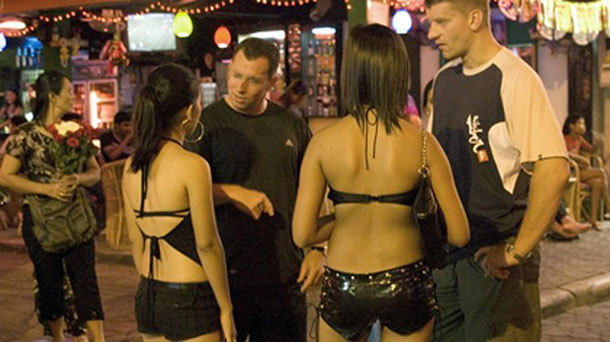Since the days of the Vietnam War, Bangkok, with its louche hotspots like Soi Cowboy and Patpong, has been a haven for lonely ex-GI’s, drunks and others looking for love in all the wrong places, as the song goes.
But it appears that the days when a middle-aged male could wash up on Thailand’s shores to find romance and cheap housing and excellent food on a tourist visa and make “border runs” to Cambodia or Burma to renew the visas in a few hours, then return to Thailand, are ending. In addition to sending home as many as 200,000 Burmese workers, the junta is also lining up to send the drunks and sex tourists home.
Of course there are plenty of productive expatriate westerners in Thailand who do more than drink and chase girls. They are either freelancing illegally—IT, design, online writers—or have enough independent cash to eke out a living. The country for decades has been a welcoming home for freelance writers and photographers who use either Bangkok or the northern city of Chiang Mai, with their low costs and good flight connections to other regions, as a base.
Among them are so-called “digital nomads,” location-independent entrepreneurs who favor Thailand. Many stay on tourist visas, traveling around the region and returning to Thailand thanks to its low cost for high quality living, its reliable high-speed Internet and other attractive perks.
But there are pockets of problems. A substantial population of Russians are constantly in the papers for crashing cars, spinning con games or being involved in violent bar fights. The government is clearly fed up and is seeking to prevent people from working illegally in Thailand and to decrease crime.
The Immigration Bureau has been on a campaign to root out foreigners for a long time. A fairly large number of Caucasians lived in Chiang Mai on tourism visas, crossing the border into Burma or elsewhere every month or 90 days to renew and then come back but the government cracked down about four years ago, a Chiang Mai-based editor said.
“But definitely there is no shortage of lonely older guys still propping up bars in Chiang Mai,” he said. “I would say that across the country they number in the tens of thousands.”
The brief overland trips in and out of neighboring countries have long been popular among long-stay travelers and tourists who want to extend their time in the country. Even those on valid tourist visas may be denied entry if immigration officials suspect feel they are spending too long in the country or working illegally.
Although some border crossings had appeared more lenient than others since a crackdown was announced in May, new directives to weed out those who are not “genuine tourists” have gone countrywide.
“Every immigration post on land borders and at airports now has the same rules,” said Pol Col Sanchai Chokkayaikij, Superintendent of the Phuket Immigration Office, told local media in Phuket. “If they are genuine tourists that’s fine. But if we believe they are not tourists, they will not be readmitted into Thailand. We can see [from their passport stamps] if a foreigner has stayed in Thailand too long [on tourist visas]. We will not let them in.”
The Immigration Bureau announced in May that those taking advantage of the in-and-out exemptions would be scrutinized and that border runs by land were being phased out. Those by air will be allowed until mid-August, after which the same-day reentry would no longer be possible for tourists.
Those wishing to stay in the country longer than the 30-day exemption allowed were encouraged to apply for 60-day tourist visas, which are easily available from Thai embassies and consulates around the world.
People did heed the warning in May and left to secure proper tourist visas. But now that may not be enough. The Thai Visa website reported that some foreigners with proper visas were refused entry at points along the Thai-Malaysian border.
Their reporter said 20 foreigners holding 60-day tourist visas were turned away at the Sungai Kolok crossing to Malaysia in Narathiwat Province, and that “all of the foreigners who were denied entry had a previous history of multiple visa exempt entries or back to back tourist visas.”
They were told to take a bus to Kuala Lumpur and fly back into Thailand. Those affected were from several different countries, including the US, UK, Ukraine, New Zealand, Romania, Russia, and Italy.
The fact that even those holding visas are being denied in some cases suggests the seriousness of this crackdown. Though Immigration officials can deny anyone entry, many have got by for years getting back-to-back visas or doing regular in-and-out visa exemption trips. Those concerned with the tightened standards should follow Thai Visa, which regularly has posts and forum updates on visa issues.
The crackdown will undoubtedly affect businesses built around visa run services, including tour companies that offer transportation services to and from the border.
As the rules have tightened, Chinese officials have requested a visa-free privilege for Chinese tourists to Thailand, according to The Nation. Chinese make up the number one foreign tourist group in Thailand, with 4 million visiting the country between January and October 2013. Thailand’s Foreign Ministry permanent secretary Sihasak Phuangketkeow said the request would be sent on to the National Council for Peace and Order (NCPO), The Nation reported.
“The Foreign Ministry will gather pros and cons of the free-visa privilege and submit them to the NCPO to substantiate this for consideration,” they quoted Sihasak as saying. The agreement would allow Thais to travel to China visa-free as well.

















